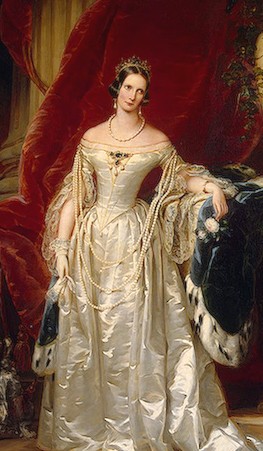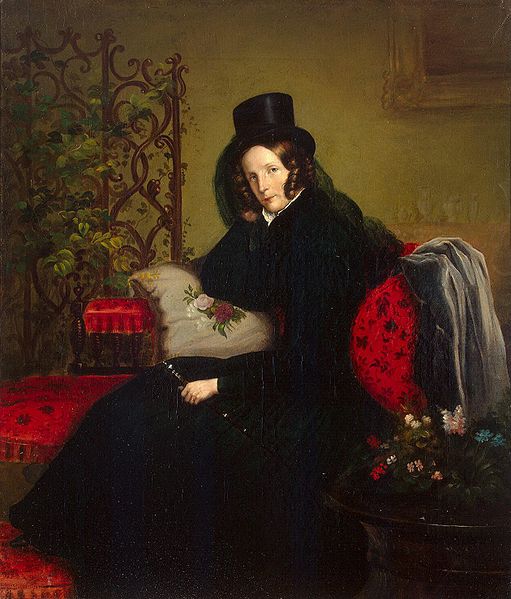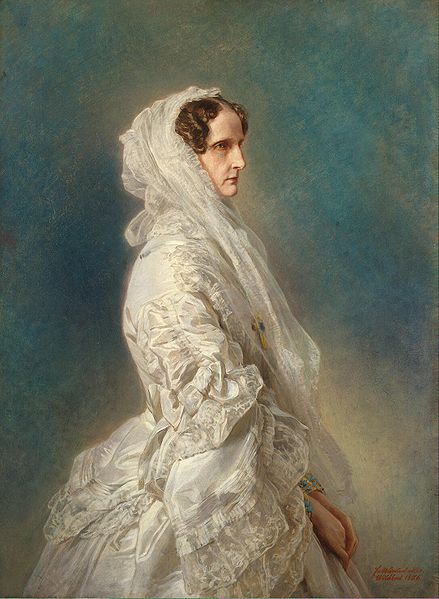<Back to Index>
- Ethnographer Stewart Culin, 1858
- Poet John Clare, 1793
- Empress consort of All the Russias Alexandra Feodorovna, 1798
PAGE SPONSOR
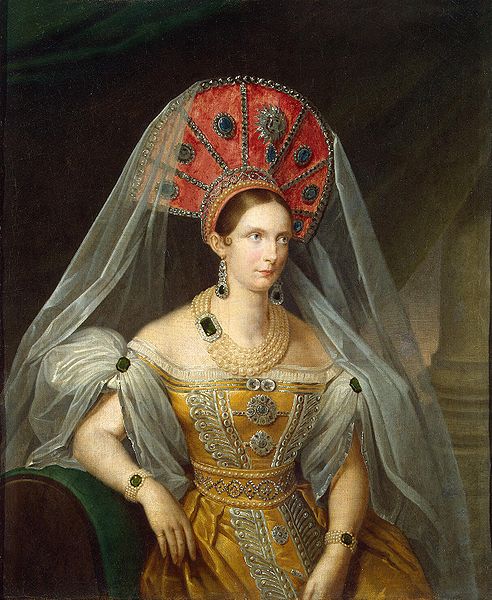
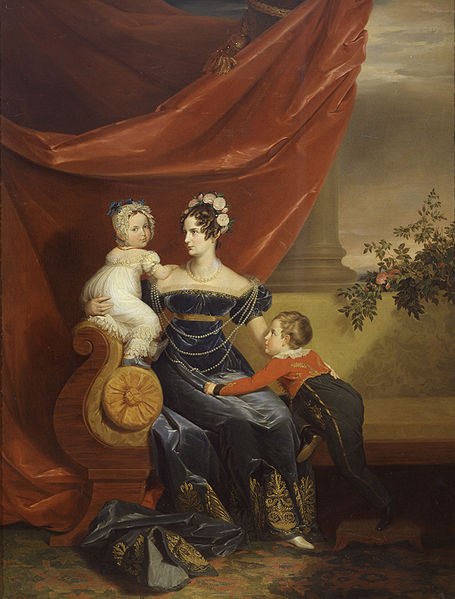
Alexandra Feodorovna, born Princess Charlotte of Prussia (13 July 1798 – 1 November 1860), was Empress consort of Russia. She was the wife of Tsar Nicholas I, and mother of Tsar Alexander II.
Alexandra Feodorovna was born on 13 July 1798 at the Charlottenburg Palace, as Princess Frederica Louise Charlotte Wilhelmina of Prussia. She was the eldest surviving daughter and fourth child of Frederick William III, King of Prussia, and Louise of Mecklenburg - Strelitz, and a sister of Frederick William IV of Prussia and of Wilhelm I, German Emperor.
Princess Charlotte's childhood was marked by the Napoleonic Wars. After the French defeat of the Prussian army, Princess Charlotte and her whole family were forced to flee to East Prussia, where they were given protection by Tsar Alexander I. Soon, Berlin fell under Napoleon’s control, and Princess Charlotte grew up in war torn Memel, Prussia. Her mother died in 1810 shortly after Charlotte’s twelfth birthday, and for the rest of her life she treasured her mother’s memory. From her early childhood, Princess Charlotte occupied the first female rank in Prussia as the eldest daughter of her widower father. She would remain attached to Prussia and her family all of her life.
In the fall of 1814, Grand Duke Nicholas Pavlovich of Russia, the future Tsar Nicholas I, and his brother Grand Duke Michael, visited Berlin. Arrangements were made between the two Royal families for Nicholas to marry Princess Charlotte, and on the second visit the following year, Nicholas fell in love with the then seventeen year old Princess Charlotte. The feeling was mutual, "I like him and am sure of being happy with him." She wrote to her brother, "What we have in common is our inner life; let the world do as it pleases, in our hearts we have a world of our own." Hand-in-hand, they wandered over the Potsdam countryside, and attended the Berlin Court Opera. By the end of his visit, Grand Duke Nicholas and Princess Charlotte were engaged. They were third cousins, as they were both great-great-grandchildren of Frederick William I of Prussia. The wedding would not take place for another two years.
On 9 June 1817 Princess Charlotte came to Russia with her brother William. After arriving in St. Petersburg she converted to Russian Orthodoxy,
and took the Russian name Alexandra Feodorovna. On her nineteenth
birthday, 13 July 1817, she and Nicholas were married in the Chapel of the Winter Palace.
"...I felt myself very, very happy when our hands joined..." she would
later write about her wedding. " With complete confidence and trust, I
gave my life into the hands of my Nicholas, and he never once betrayed
it." At
first, Alexandra Feodorovna had problems adapting to the Russian Court,
the change of religion affected her and she was overwhelmed by her new
surroundings. She gained the favor of her mother-in-law, Maria Feodorovna, but did not get along well with the Empress Elizabeth Alexeievna, wife of Tsar Alexander I. Weeks after the wedding, Alexandra was pregnant. On 17 April 1818, she gave birth to her first son, the future Tsar Alexander II, and the next year she had a daughter, Grand Duchess Maria Nikolaevna.
In 1820 Alexandra produced a stillborn daughter, her third pregnancy in
three years, which brought on a deep depression. Her doctors advised a
holiday, and in the autumn of 1820 Nicholas took her to see her family
in Berlin, where they remained until the summer of 1821, returning
again in the summer of 1824. They did not come back to St. Petersburg
until March 1825 when Tsar Alexander I required their presence in Russia. Alexandra
Feodorovna spent her first years in Russia trying to learn the language
and customs of her adopted country under the tutelage of the poet Vasily Zhukovsky, whom she characterized as being "too much of a poet to be a good tutor." The Imperial family spoke German and wrote their letters in French, and as a consequence, Alexandra never completely mastered the Russian language. Nicholas
and Alexandra Feodorovna were private people who found great pleasure
in each other’s company. She wrote in her memoirs of her first years in
Russia, "We both were truly happy only when we found ourselves alone in
our apartments, with me sitting on his knees while he was loving and
tender". For eight years, during the reign of Tsar Alexander I, the
couple lived quietly, never once looking forward to the possibility of
occupying the Russian throne. Tsar Alexander I had no children and his
heir, Grand Duke Konstantin Pavlovich, renounced his succession rights in 1822, making Nicholas the new Tsarevich. In 1825, Alexandra received from her brother-in-law, Alexander I the Palace of Peterhof, where she and Nicholas lived happily at the start of her life in Russia. It would remain her favorite summer residence. Alexandra was tall, slender with a small head of refined features. Her blue eyes were set deep in her head. She had an air of regal majesty. Her quick, light walk was graceful. She was frail, often in poor health. Her voice was hoarse, but she spoke rapidly and with decision. Alexandra
Feodorovna was an avid reader and enjoyed music. She was kind and liked
privacy and simplicity. She dressed elegantly, with a decided
preference for light colors, and collected beautiful jewels. Neither
arrogant nor frivolous, Alexandra was not without intelligence and had
an excellent memory; her reading was quite extensive; her judgment of
men sure, slightly ironical. However,
her interests were mostly shallow. She loved to dance and the fantastic
world of the Palaces and court balls filled her horizon. She
did not worry about knowing the real problems of the Russian people
that demanded from its Empress the energy to take care of the needed
and the sick. For
her, Russia was summed up in the person of her beloved husband. By
forcing his will on this fragile, irresponsible and delicate creature,
Nicholas destroyed Alexandra’s individuality. Her
husband gave her no time for reflection, for giving herself a sustained occupation, other than adoring wife and devoted mother. Alexandra Feodorovna became Empress - Consort upon her husband's accession as Tsar Nicholas I on December, 1825. It was a turbulent period, marked by the bloody repression of the Decembrist revolt. By
1832 Nicholas and Alexandra had seven children whom they raised with
care. Nicholas I never wavered in his love for his wife, whom he
nicknamed “Mouffy”. In 1837, when much of the Winter Palace was
destroyed by fire, Nicholas reportedly told an aide-de-camp, "Let
everything else burn up, only just save for me the small case of
letters in my study which my wife wrote to me when she was my
betrothed." Only
after more than twenty-five years of fidelity did Nicholas take a
mistress. He turned to Barbara Nelidova, one of Alexandra's
ladies-in-waiting, as the doctors had forbidden the Empress from sexual
activity due to her poor health and recurring heart attacks. Nicholas
continued to seek refuge from the cares of state in Alexandra’s
company. "Happiness, joy, and repose - that is what I seek and find in
my old Mouffy." he once wrote. In 1845, Nicholas wept when Court doctors urged the Empress to visit Palermo for several months due to poor health. "Leave me my wife." he
begged her physicians, and when he learned that she had no choice, he
made plans to join her, if only for a brief time. Nelidova went with
them, and though Alexandra was jealous in the beginning, she soon came
to accept the affair, and remained on good terms with her husband's
mistress. The
Empress Alexandra Feodorovna was always frail and in bad health. At
forty, she looked far older than her years, becoming increasingly thin.
For a long time, she suffered from a nervous twitching that became a
convulsive shaking of her head. In 1837 the Empress chose the resort in the Crimea for
a new residence. There, Nicholas ordered that the Palace of Oreanda be
built for her. She was only able to visit the Palace once however; the Crimean War began in 1852. Towards the end of 1854, Alexandra Feodorovna became very ill, and she came very close to death, though she managed to recover. In 1855 Tsar Nicholas I contracted influenza, and he died on 6/18 February. Alexandra Feodorovna survived her husband for five years. She retired to the Alexander Palace at Tsarskoe Selo, and remained in good terms with her husband’s mistress Barbara Nelidova, who she made her personal reader. The Dowager Empress's health became more and more fragile with the years. Unable to spend the harsh winters in Russia,
she was forced to make long sojourns abroad. She wrote in September
1859 "I am homesick for my country and I reproached myself for costing
so much money at a time when Russia has need of every ruble. But I
cough and my sick lungs cannot go without a southern climate". In
the autumn of 1860, her doctors told her that she would not live
through the winter if she did not return once more to the south.
Knowing the danger, she preferred to stay in St. Petersburg, so that if
death did come it would happen on Russian soil. The night before her
death, she was heard to say, "Niki, I am coming to you." She died in her sleep at the age of sixty-two on 1 November 1860 at Alexander Palace in Tsarskoe Selo.
